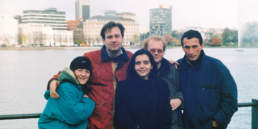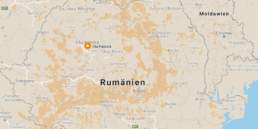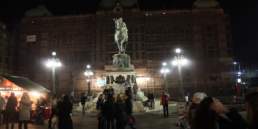22 AEGEE members observed the parliamentary elections in Moldova on the 30th of November. In the framework of the Election Observation Project (EOP), the observers visited around 50 polling stations in pairs of two. The Golden Times interviewed two observers from Vienna, who formed one of the teams. Anna-Valentina Walden is a Political Science student at the University of Vienna, working for the Embassy/Permanent Mission of the Kingdom of Morocco in Austria. Alin-Florin Calin is the co-founder of the Election Observation Project in AEGEE, engaged on many AEGEE activities and currently studies International Law at the University of Kent in Canterbury, UK. Together they visited polling stations in Chisinau during election day and counting night.
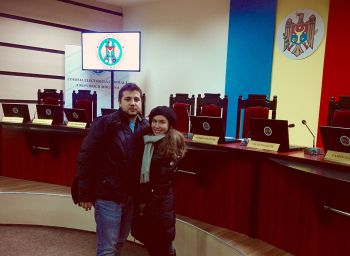
GT: Alin, the EOP project was probably the most popular project in AEGEE in 2014. Did you expect this project to take off so well?
Alin-Florin Calin: To be honest, not at all. Thomas Leszke and I started the project in autumn 2013 with the idea of bringing election observation and democracy closer to our network but with an open end. I particularly remember one of my meetings with the head of division of the department “caucus” in the Austrian Ministry for the Interior. The experts were very supportive, but they told me that getting an accreditation from national governments as a students organisation will be hard. They had not heard about similar cases before. However, we had a great start after our first two group meetings in Cologne and Brussels and gathered a strong team. Moreover we received significant support from the CD and by experienced AEGEE members, such as former CD member and Chairperson Alla Resheten during our first mission to Ukraine.
GT: How big is the pool of election observers in the project? And how are they trained to do their task?
Alin: We had 88 election observers on our missions so far, and our mailing list with potential observers includes 114 people. Our observers have to complete an OSCE online training course before going on a mission. Apart from that, we already applied for funding for a real training course and we hope that we can offer a more comprehensive training in 2015.
GT: Which elections did you observe so far?
Alin: In 2014 we went to Ukraine twice, for the presidential elections in May and the parliamentary elections in October, we went to Scotland for the referendum on independence in September, to Bosnia for the general elections in October – and now to Moldova for the parliamentary elections in November.
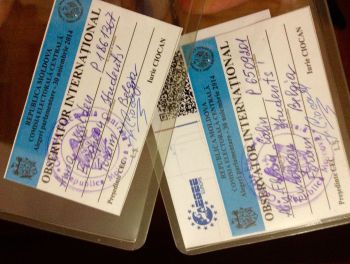
GT: Which elections are on the agenda for 2015?
Alin: For 2015 we haven’t made our final decision yet, but we have exciting prospects, especially Turkey, United Kingdom, Ukraine once more, and… Israel! I personally would like to see Belarus on our agenda 2015 as well, although it is a quite challenging case.
GT: Can more interested members join?
Alin: Anyone can join who is at least 18 years old, is able to communicate in English, and has enough time to prepare properly. If you are interested, you can write to eop@aegee.org and you will be added to our mailing list. More information is also available on our Facebook page www.facebook.com/aegee.eo and our website aegee.org/eop
GT: Alin, you were in EOP from the first moment and joined the most current mission to Moldova, two weeks ago. What are your future plans in EOP?
Alin: EOP became an official AEGEE project in Agora Cagliari in October 2014. At that point I decided not to join the operative project team due to a heavy workload abroad.
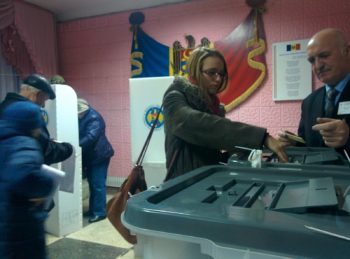
GT: How were your personal experiences of the elections in Moldova?
Valentina: I was under the impression that the conduct of the elections met international standards to a rather great extent. Bearing in mind that technical and infrastructural resources are limited in Moldova, I did expect to encounter bigger obstacles than presented themselves, which was a pleasant surprise. The presence of national and international observers at the polling stations was also positively acknowledged and conveyed a feeling of transparency and regulation.
Alin: I can second my colleague. Ballot papers were provided in Romanian and Russian, depending on the numbers of locals registered in the precincts. The elections were well organized, polling stations staff members were very helpful, friendly and transparent in the answers to our questions. The most positive impression was the kindness displayed by all committee members at each polling station – and in particular by the presidents, they even took time for cookies and tea or coffee with the observers.
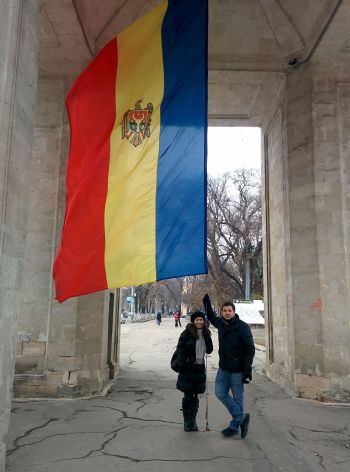
GT: How many election observers were there?
Alin: I was impressed by the great amount of observers in the six polling stations we visited. 3192 Moldovan citizens and 816 international observers were accredited, among them 22 students as AEGEE observers.
GT: Did you notice something peculiar?
Alin: To shed a more critical light, I would like to point out several things. Since the electronic system slowed or broke down completely continuously during the day, malfunctions and irregularities couldn’t always be transparently observed. Those technical problems led to long queues of people waiting to cast their votes. Furthermore, even though the polling station presidents made a significant effort to follow the Electoral Code, we observed at the first station that the procès-verbal for the ballot box was not placed in every provided box, so in the worst-case scenario, this could have led to the impossibility to identify the origin of the box during the counting. The organization of several polling stations was often not ideal; the layout and size of the station clearly plays a major role in how transparent the process of voting presents itself.
GT: Anything else?
Alin: At two different polling station, some tension could be witnessed when elderly voters realized that people were registered under their home address when they were actually long dead or residing elsewhere. Reports also show that there are still issues regarding campaign finance regulations and the handling with candidate lists, which had to be altered on a very short notice before the elections.
GT: Did you get the opportunity to talk with locals?
Valentina: Personally, only with AEGEE locals and unfortunately not in depth.
Alin: Since I was born in Transilvania, I speak Romanian fluently and had a great advantage by receiving detailed information to all our questions from committee members and could translate for my colleague in German and English. We did not talk to voters due to the workload during the day, but before the elections and after that, also because we met with local students from AEGEE-Chisinau.
GT: What were their feelings about the elections?
Valentina: Especially young people expressed a cautious optimism regarding their future and the long-term orientation of their country, hoping for a continuing pro-European integration.
Alin: I think they are pretty much concerned about the ongoing armed conflict close to their border with Ukraine and with Moldova’s relation to the Russian Federation. Nowadays many citizens are seeking closer relations to the EU and Romania. The majority of young people I spoke with just finished the procedure or are in the process of obtaining the Romanian citizenship. The Romanian government has simplified this process.
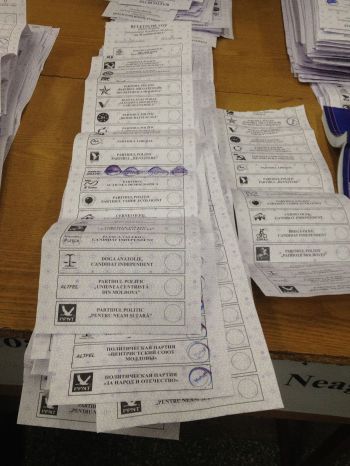
GT: Were the people pessimistic about their future?
Valentina: Not openly. I would describe their status as somehow “holding their breaths”, not quite sure what to expect, but hoping for the best.
Alin: I agree, Moldovan society develops, the standard of living improves constantly, although struggles and the 2008 crisis are still all too obvious. We shall also not forget that there was a significant civil unrest in 2009, after which people were hoping for a better future; but things move slowly.
GT: Did they speak about the relationship with Russia?
Valentina: To some smaller extent and depending on whether they considered their heritage more Romanian or more Russian. They made it clear that an orientation towards Russia could lead to more instability in the region and an even more uncertain future.
Alin: There is a fear due to the size difference of the countries, the situation with Transnistria, but also Crimea and the conflict in Ukraine. The Russian Federation is a big topic. This is reflected by the electoral contestants and in particular the pro-Russian party Patria, which was deregistered due to the accusation of having received foreign funds and so violating the law. Moreover, many Moldavians are working in Russia, but some of their relatives told me that they feel like guests there, not more. Other citizens seek closer links to the past empire. I would say there is a north-south spectrum, easy to be demonstrated by the election results. The clearest message I remember were ballot papers multiply stamped in the Patria section and even some with capital letters of this party all over the list, stating their discontent about the authorities’ decision to exclude this pro-Russian choice.
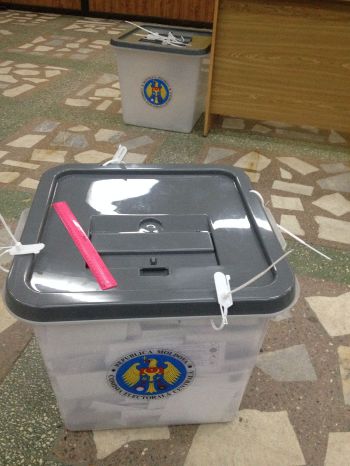
GT: Were there a lot of young people who went voting?
Valentina: Hard to say and greatly depending on the neighborhood of the polling station. In stations located for example in universities, the share of young people obviously outweighed the one of the elderly. We did meet a group of young people on the street who approached us, asking us for the location of the nearest polling station.
GT: How would you describe the political situation in Moldova?
Valentina: Given the current political landscape in the whole region, those elections where particularly interesting, since the voters went to polls torn between Russia and Europe, knowing that their decision would have a paramount impact on the long-term orientation of their country. The Moldovan politics is shaped by almost equally strong political parties – be it the Communists, Democrats or Liberals. In total, the Central Electoral Commission registered 25 participants in the election: 20 political parties, 1 electoral bloc and 4 independent candidates. This meant that the voters had a lot of different tendencies to chose from. With a voter turnout of 55.86%, the country clearly has still a long way to go in order to build the citizens’ trust in their political system. It should be noted that the Russian-backed breakaway region of Transnistria did not take part in the elections. Beforehand there were fears of civil unrest, if the outcome would not go down well with large parts of the population. Fortunately this did not take place.
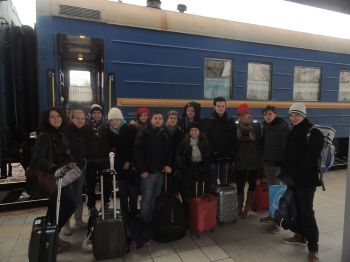
GT: How do you see the future of Moldova?
Valentina: Quick action in terms of coalition talks and the formation of a new government is needed in order not to throw Moldova back into destabilization. The pressure coming from pro-Russian parties and Russia itself is high, so the pro-European oriented winners of the elections have to act upon their promises and continue the country’s successive approximation to the EU. This assured and with the help from the EU and other democratic partners, the whole region and especially Moldova can look forward to a promising future.
Alin: The country’s geopolitical aspirations are clearly towards a closer relation with the EU. Although Moldova has gone through many reforms since its independence in 1991, the focus shall remain on improvements in areas such as the economy, the education, science and research, a health system in dire need of improvement and the rule of law. This is the impression I received. Moldova is not alone with its status, for instance if we take a look at the brand new Corruption Perception Index 2014 of Transparency International.
GT: In this index Moldova is on place 103, behind China, Egypt and Colombia. Russia is 136th, Ukraine as lowest ranked country on place 142…
Alin: Our students’ network has chosen the topic of “Europe and Russia: Today’s challenges from youth perspective” for its next thematic conference and we seek to discuss our position on the relationship between Europe, the European Union and Russia. And to finish on a positive note regarding our task in Moldova: I was particularly impressed by the kindness of the people, the peaceful co-existence of many minority groups there, the beautiful country as well as its capital Chisinau. The authorities strived to contribute to a better future. We believe the election administration met the standards necessary to ensure democracy and fair elections. Hopefully on our next visit to Moldova, we will be able to congratulate its people for becoming new members of the EU.

